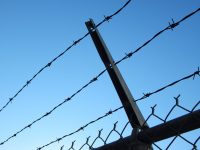Private Prisons Planned for New South Wales

Private operators will be invited to tender to manage at least one prison in New South Wales, according to Corrections Minister David Elliott (above left)
Speaking this morning, Mr Elliott announced the NSW Government’s plan to allow the private sector to bid to run John Morony Correctional centre, in a move to improve the way the prison is administered.
Private firms will be invited to submit tenders to show how well they could improve the prison, and at what cost. Mr Elliott confirmed the process could be extended to all prisons in New South Wales, if successful.
“This isn’t privatisation – this is market testing,” Mr Elliott told the Daily Telegraph.
“I’m saying to the private sector and the public sector – let’s see the best that you’ve got to offer. Prisons in NSW are thirsting for reform. This is about the taxpayers of NSW get the best opportunity they have to manage their prisons.”
It is understood the firms will have to demonstrate their success across a range of benchmarks, including preventing recidivism. Latest figures show more than half of all inmates have been in prison at least once before, adding pressure to overcrowding – which is believed to be a contributing factor in a riot that occurred in Parklea prison earlier this year.
Private Prisons a Threat to Democracy, say Critics
The plan has already been met with criticism from Greens MP and Justice spokesperson David Shoebridge, who blames overcrowding on the Government’s failure to tackle justice reform.
Mr Shoebridge is concerned that privatisation will not help reduce overcrowding, but instead create a dangerous political incentive for private companies to lobby politicians to drive more people into the state’s prison network.
“There is a real and ongoing risk for NSW politics when multi-national corporations have a billion dollar interest in putting more and more citizens in gaol,” Mr Shoebridge told Sydney Criminal Lawyers®.
“We have seen repeated human rights abuses in the privatised off shore refugee detention facilities run by the Commonwealth, and it is exactly those same corporations like Serco who are lining up to profit from privatised NSW prisons.”
According to a recent report by the United States based prison reform group, the Sentencing Project, private prisons in America have done little to solve overcrowding or recidivism:
“Research to date on private prisons has found that they perform no better than publicly operated facilities, are not guaranteed to reduce correctional costs, and provide an incentive for increasing correctional and detention populations.
“Despite these repeated failings, many countries, including those facing serious problems in the quality and capabilities of their correctional systems, have followed the United States in adopting a flawed and shortsighted scheme.”
In Victoria, nearly one-third of inmates are held in private prisons, giving it the highest level of prison privatisation of any jurisdiction in the world.
The percentage of inmates held in private prisons in Australia has increased 95 per cent in the past 15 years. In that same period, the number of inmates in state-run jails grew by 50 per cent and the total prison population has increased by 57 per cent.
Cash for Kids Scandal
In 2013, Mark Ciavarella, a judge in the United States, was found guilty of taking more than $2 million in bribes from the operator of a private youth prison network, in exchange for sending more children to prison.
Between 2003 and 2008 Ciavarella filled the beds of the private prisons with children as young as 10, many of them first-time offenders convicted of minor crimes. The former judge once sent an African-American child to jail for three months for posting negative comments about her assistant principal on MySpace.
Following his conviction, the Pennsylvania Supreme Court was forced to overturn around 4,000 convictions overseen by Ciavarella on the basis that he violated the constitutional rights of the juveniles – including the rights to legal counsel and to intelligently enter a plea.
Ciavarella was sentenced to 28 years in prison, and ordered to pay back $1.2 million he had taken in kickbacks.
Companies that operate private prisons around America have come under increased criticism for their strong ties to State Governments, and impact on the justice system.
In an interview with RT last year, Paul Reynolds, a former corrections officer at a privately owned prison, spoke about his experience working in the facility – and accused the Government of conspiring to keep prison beds full:
“You’re going to take somebody who smokes marijuana – let’s be honest, that’s not a very crime-worthy thing, a lot of people do it, police officers do it, who arrest these people and put them in jail – but when the state can say “Hey, you’re going to make $2 and you’re give us a dollar back for every inmate we give you.” That’s sounds like they don’t care. Once again, people become chattel as a way of making money for the state and for the private prisons. Of course, they’re going to want to keep it open.”
The current proposal has confirmed the view of many that the NSW Premier is more concerned with pleasing big business than social justice.






